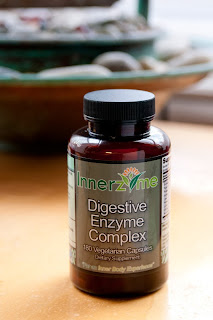What are the differences between Digestive Enzymes and Probiotics?
Digestive enzymes and probiotics both work to support proper digestive
health but in different ways. Digestive enzymes work directly with the
food a person consumes to break down carbohydrates, fats and protein
into small
substrates that can be properly absorbed and nutrients utilized by the
body for energy throughout the day. Enzymes are naturally produced by
the body, however, as a person ages, they can become deficient which can
create inflammation and stress on the body starting in the
gastrointestinal tract. Probiotics are live bacteria that assist with
balancing the "flora" digestive
tract, improving vitamin absorption and may help reduce lactose intolerance.
Probiotics can take up to a few months to get into your system and for a
person to be able to determine whether or not they are working
properly. Probiotics do not break down food but rather work to create a
state of balance in a person's digestive tract. Since digestive
enzymes work directly with the food a person eats, when taken with a
meal, they begin to break down right away and many people report feeling
a difference after adding enzymes to 1 or 2 meals, especially those who
are in tune with their body.
Seven months ago I was introduced to Innerzyme, a line of natural enzyme supplements from a local nutraceutical company, founded and directed by Katie Jodscheidt. I had previously prescribed pharmaceutical-grade enzymes, such as lipases and pancreases, as well as over-the-counter enzymes, but my experience with Innerzyme has superceded my previous ones. I first implemented Innerzyme’s Digestive Enzyme Complex and Papaya Enzyme Chewable into my practice and patients reported that it was easy to administer with a very quick rate of onset and symptom relief. I have since also started incorporating Innerzyme’s Pain & Inflammation Blend with similar results.
I honestly think that Innerzyme’s product is superior to most other enzymes available on the market. It
is natural, easy to administer, quick in onset, and yields great
results for patients with a large gamut of clinical conditions, from
indigestion and reflux, to bloating, gassiness, and diarrhea. I
have given out many samples and quite often patients return reporting
significant benefit and ask to purchase the product. The price is very
reasonable and comparable to similar products on the market, but I trust
Innerzyme after having had the chance to discuss the manufacturing
process with Katie and after seeing the significant benefit to my
patients, beyond that of other, generic digestive enzymes.
As
a Pediatrician, I often prescribe dietary modification for nursing moms
whose children present with colic, reflux, eczema, and sometimes frank
bloody stools. Allergic proctitis in infancy is not
uncommon and current standard therapy is to switch formula to a
“hydrolyzed” or pre-digested formula. I have added Innerzyme to mom’s regimen and have observed a significant improvement in the nursing child’s clinical symptoms. It
makes sense, since extensive digestion reduces the antigenicity of food
and may thus help with symptom relief, from reflux and colic to eczema,
which is an immune-mediated disease.
Digestive
enzymes may indeed represent a paradigm shift in the care of
gastrointestinal issues, from peptic disease and functional dyspepsia to
gastroesophageal reflux disease (GERD), irritable bowel syndrome, food
sensitivity, and malabsorption. My ultimate goal is to “graduate” my patients to complete wellness through specialized care and education. Since adding Innerzyme into my practice, I am very pleased to see improved results in my graduation rates.



No comments:
Post a Comment